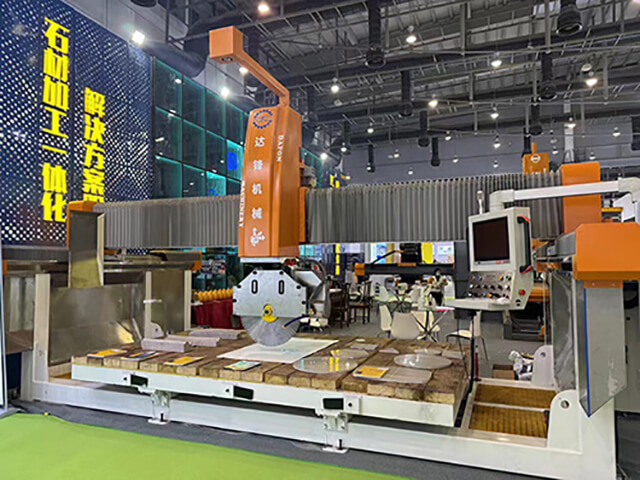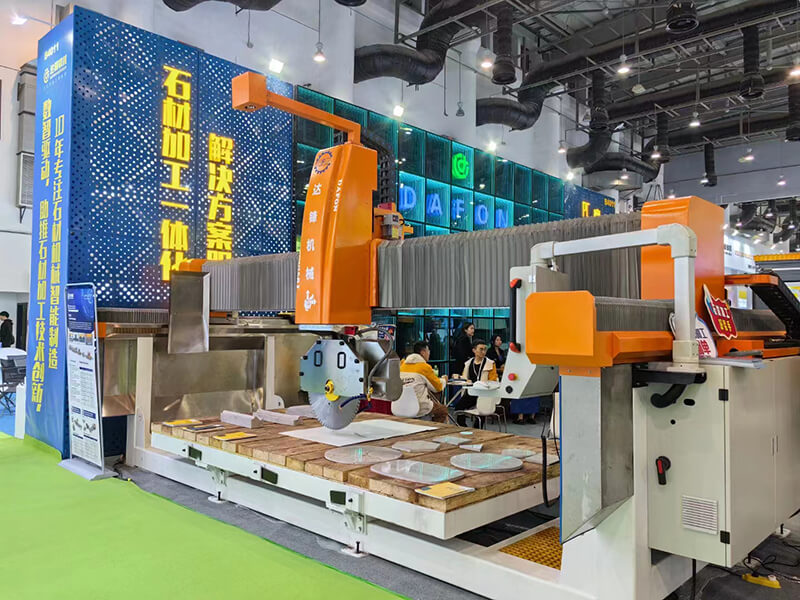Author:Dafon Kerbstone Machine FROM:Stone Machine Manufacturer TIME:2024-08-08
Yes, a CNC machine can cut granite. CNC cutting machines are highly capable of cutting and shaping hard materials like granite with precision. These machines use diamond-tipped tools or blades that are specifically designed to handle the hardness and density of granite. CNC machines are widely used in the stone industry for various applications, including:
Cutting Slabs: CNC machines can cut large granite slabs into specific shapes and sizes.
Profiling Edges: They can create intricate edge profiles on countertops and other granite products.
Engraving and Etching: CNC machines can engrave detailed patterns, text, or logos onto granite surfaces.
Drilling and Boring: They can drill holes for sinks, faucets, and other fixtures in granite countertops.
Using a CNC machine for granite offers several advantages, including high precision, consistent quality, and the ability to create complex shapes and designs efficiently.
Yes, a CNC machine can engrave stones. CNC machines are equipped with specialized tools and software that allow them to engrave a variety of stone materials, including granite, marble, limestone, and others. Engraving stones with a CNC machine offers several benefits:
Precision: CNC machines can engrave intricate designs, detailed patterns, and fine text with high accuracy.
Consistency: Once a design is programmed, the CNC machine can replicate it consistently across multiple pieces.
Efficiency: CNC engraving is faster and more efficient compared to manual engraving, reducing production time.
Versatility: CNC machines can handle various stone types and can be used for different applications, such as creating tombstones, memorial plaques, decorative panels, and customized stone products.
The engraving process typically involves using diamond-tipped or carbide tools that are capable of cutting into the hard surface of the stone. The design is first created using CAD software, and then the CNC machine follows the programmed paths to engrave the stone.
CNC machining can be expensive due to several factors:
1.High Initial Investment: Purchasing a CNC machine involves significant upfront costs. These machines are sophisticated pieces of equipment that incorporate advanced technology, precision components, and durable materials.
2.Maintenance Costs: CNC machines require regular maintenance to ensure optimal performance and longevity. This includes servicing, calibration, and replacement of parts, which can be costly.
3.Tooling Expenses: The tools used in CNC machining, such as diamond-tipped or carbide tools for stone cutting, can be expensive. These tools wear out over time and need to be replaced regularly.
4.Software Costs: CNC machines rely on specialized software for design and operation. The cost of purchasing, updating, and maintaining this software adds to the overall expense.
5.Skilled Labor: Operating a CNC machine requires skilled technicians who are trained in programming, setup, and maintenance. The cost of hiring and training these professionals contributes to the expense.
6.Energy Consumption: CNC machines consume a considerable amount of energy, especially when working with hard materials like stone. The cost of electricity adds to the operational expenses.
7.Material Waste: Although CNC machining is precise, some amount of material waste is inevitable. High-quality raw materials, especially stones like granite and marble, can be expensive.
8.Customization and Complexity: The more complex and customized the machining job, the higher the cost. Intricate designs, tight tolerances, and specialized finishes require more time and resources.
Despite these costs, CNC machining is often considered a worthwhile investment due to its precision, efficiency, and ability to produce high-quality, consistent results.

Reducing CNC machining costs can be achieved through various strategies:
Optimize Design:
Simplify Geometry: Simplify the design to reduce the complexity of the machining process. Avoid intricate details that require additional tool changes or specialized tooling.
Standardize Features: Use standard hole sizes, threads, and other features to minimize the need for custom tooling.
Minimize Tight Tolerances: Only apply tight tolerances where necessary to reduce machining time and inspection costs.
Material Selection:
Choose Machinable Materials: Select materials that are easier to machine, which can reduce tool wear and machining time.
Material Efficiency:
Optimize material usage by nesting parts efficiently to reduce waste.
Batch Production:
Larger Batches: Produce parts in larger batches to spread setup and tooling costs over more units.
Standardize Parts:
Use common parts across different products to take advantage of economies of scale.
Tooling and Equipment:
Tool Management: Use high-quality, durable tools to reduce the frequency of tool changes and downtime.
Tool Path Optimization:
Optimize tool paths to minimize machining time and improve efficiency.
Maintenance:
Regularly maintain equipment to ensure it operates efficiently and reduces the risk of costly breakdowns.
Process Improvements:
Automate Processes: Implement automation to reduce labor costs and increase consistency.
Lean Manufacturing: Adopt lean manufacturing principles to eliminate waste and improve process efficiency.
Reduce Setups:
Minimize the number of setups required by combining operations when possible.
Supplier Collaboration:
Communicate with Suppliers: Work closely with your CNC machining supplier to understand their capabilities and constraints. They may offer suggestions for design modifications that reduce costs.
Production Planning:
Optimize Scheduling: Plan production schedules to minimize machine idle time and ensure continuous operation.
Preventive Maintenance: Schedule regular maintenance to prevent unexpected downtime and costly repairs.
Training and Workforce Development:
Skilled Operators:
Invest in training operators to improve their efficiency and reduce errors.
Cross-Training:
Cross-train employees to handle multiple tasks, increasing flexibility and reducing labor costs.
Implementing these strategies can help reduce CNC machining costs while maintaining quality and efficiency.

Yes, there is a promising future for CNC machining. Several factors contribute to the continued growth and advancement of this technology:
Automation and Precision: CNC machines offer high levels of automation and precision, reducing the need for manual intervention and minimizing human error. This makes them ideal for industries that require high accuracy and consistency.
Advancements in Technology: Continuous improvements in software, hardware, and machine learning are enhancing the capabilities of CNC machines. This includes better control systems, more user-friendly interfaces, and integration with other advanced manufacturing technologies
Industry 4.0: The integration of CNC machines into smart factories as part of the Industry 4.0 revolution is creating more efficient, interconnected, and data-driven manufacturing environments. This enhances productivity, reduces downtime, and allows for real-time monitoring and optimization.
Customization and Flexibility: CNC machines are highly versatile and can be programmed to produce a wide range of products. This flexibility is crucial for industries that require customized solutions and small-batch production runs.
Cost Efficiency: As technology advances, the cost of CNC machines is becoming more affordable. Additionally, the efficiency and reduced waste associated with CNC machining make it a cost-effective solution for many manufacturers.
Demand in Various Industries: CNC machining is essential in numerous industries, including aerospace, automotive, medical, electronics, and construction. The demand for complex and precise components in these sectors ensures a steady need for CNC machining.
Sustainability and Eco-Friendliness: CNC machining can contribute to more sustainable manufacturing practices by optimizing material usage and reducing waste. This aligns with the growing emphasis on eco-friendly production methods.
Given these factors, the future of CNC machining looks bright, with continued advancements and applications across various industries.